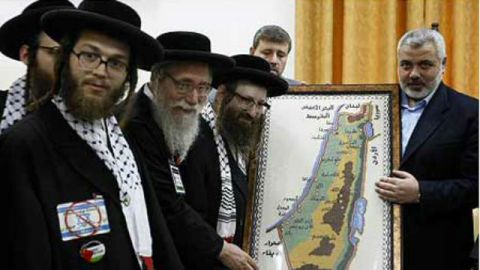Don’t Blame Religion for the Israel-Palestine Divide

In his recent post, fellow Big Think blogger Adam Lee blames the intractable Israeli-Palestinian conflict on competing religious fundamentalisms. The recent renewal of fighting on the Gaza border, he writes,
is being inflamed and prolonged by religious zealotry on both sides. Whether it’s Israelis who cite the Old Testament to advocate genocidal war, or Hamas’ enforcers legislating “religiously proper” behavior, fundamentalism only makes both sides more vicious and compromise less thinkable. Making peace requires diplomacy and mutual concession, and religion is poisonous to this process because it turns ordinary values, which can be used as bargaining chips, into sacred values which can never be compromised.
Though I share Adam’s concern about the increasing influence of ultra-Orthodox parties in Israel’s political system and have written about the tenuous balance between the “Jewish” and “democratic” elements of the Israeli constitution, I think Adam’s view of the Gaza conflict emerges from a basic misconception.
In short, the conflict is more about realpolitik, territory and security than about religious faith. This is apparent when considering the arguments and religious identity of those who have made the most inflammatory pronouncements. When Gilad Sharon, son of former Prime Minister Ariel Sharon, called for “flattening all of Gaza,” he was motivated not by Deuteronomy or a biblical vision of the Greater Land of Israel but by a morally and practically perverted sense of military strategy and a callous disregard for the lives of Palestinians. He is not a religious man, let alone an orthodox Jew, and his political views do not flow from his interpretation of perceived biblical imperatives.
To be sure, there are religious elements of Israeli society for whom the Hebrew Bible is a guide to international politics. The Zo Artzeinu (“this is our land”) movement from the 1990s which evolved into the Manhigut Yehudit faction of the Likud party, begins from the premise that God granted the land west of the Jordan river to the Jews for evermore, and founder Moshe Feiglin writes that such a commitment is not only religiously commanded but “realistic.”
But there are alternative views in this conflict. There are religious perspectives that urge a softer hand to bridge the Israeli-Palestinian divide and which interpret biblical commands quite differently. I’m not referring only to left-leaning Jewish elements for whom continued occupation of lands in which Palestinians reside is problematic religiously. I’m talking about a branch of fundamentalist ultra-Orthodox Jews who reject Zionism and deny the legitimacy of the modern state of Israel, along with its military campaigns:
The Neturei Karta party this rabbi associates with is small and few religious Jews in Israel ascribe to the political views he expresses, but a significant bloc of ultra-Orthodox Jewry shares the basic premise of his argument: that the fundamentally secular state of Israel is neither holy nor a harbinger of the coming of the Messiah. There is a long history of anti-Zionist sentiment within Judaism. Some fringe ultra-Orthodox Jews even developed biblical justifications for this month’s Hamas missile strikes on Israel.
On the other side of the border, Hamas is a militant Islamic movement for whom Muslim control of the holy land is a primary goal. Hamas won’t rest, according to its charter, until “the banner of Allah waves over every inch of Palestine.” But the Hamas platform is equally nationalist in its motivation:
While other nationalisms consist of material, human and territorial considerations, the nationality of Hamas also carries, in addition to all those, the all important divine factors which lend to it its spirit and life; so much so that it connects with the origin of the spirit and the source of life and raises in the skies of the Homeland the Banner of the Lord, thus inexorably connecting earth with Heaven.
On one hand, this quotation shows the sacred dimension of Hamas’s nationalism. On the other, ironically, it gives non-fundamentalist Palestinians a way to support Hamas despite its Islamo-fascist ontology. Hamas has not always seen widespread support among Palestinians; in 2009, the figure was only 18.8 percent. In 2011, 67 percent of Palestinians supported replacing Hamas regime. From the recent conflict it appears that Hamas won wider popular support not because of the particular way it reads the Qur’an but by demonstrating the organization’s ability to strike Israel with long-range missiles. That’s military nationalism, not religious fundamentalism, winning the war of public opinion.
Adam claims that religious values are “sacred” while “ordinary values” are easily compromised. But religious values are never monolithic, even among the faithful. Non-religious zealots can be just as intransigent about their “ordinary” values as religious zealots are about their biblical values. Navigating this conflict wouldn’t be any easier if both sides suddenly shed their religious identities. Religion may be more than window dressing on the conflict, but realpolitik and nationalism are the main fuel.
Follow Steven Mazie on Twitter:@stevenmazie





